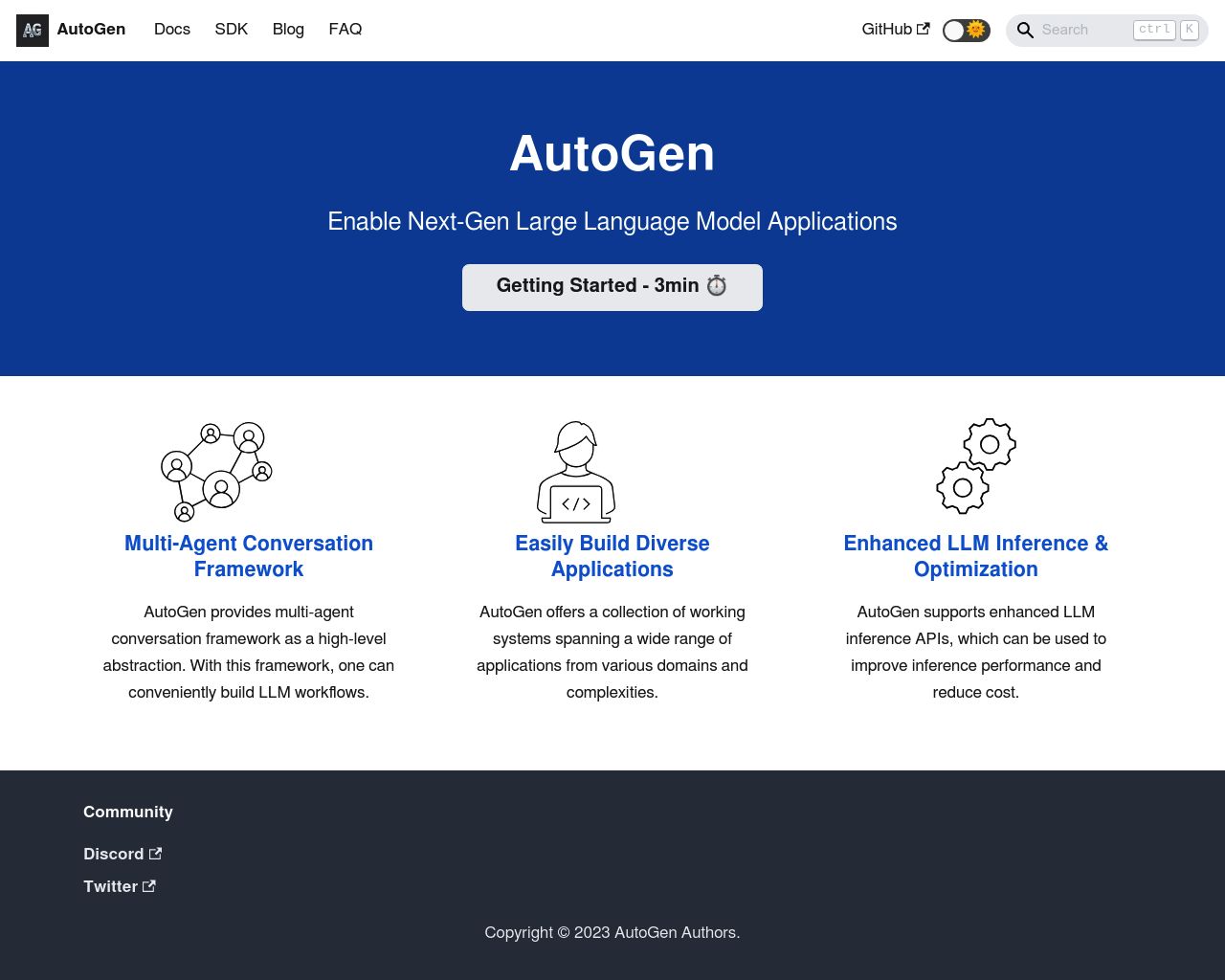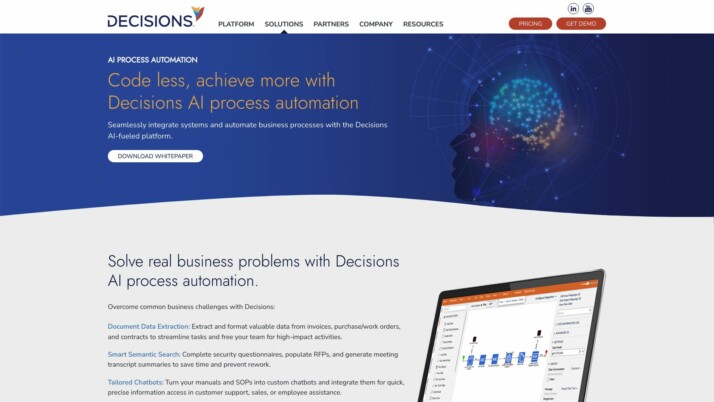AutoGen vs. Decisions: Comparing AI Automation Platforms
AI-driven automation platforms are reshaping how businesses approach complex tasks and process optimization. AutoGen vs. Decisions, and SmythOS each bring unique capabilities to the table, catering to different aspects of AI integration and workflow automation. This comparison delves into the strengths and limitations of these platforms, exploring their core features, ease of use, and potential impact on various industries.
Whether you’re a developer seeking powerful multi-agent collaboration tools, a business leader looking for no-code process automation solutions, or an AI enthusiast interested in cutting-edge applications, understanding the nuances of these platforms is crucial for making informed decisions in today’s AI-driven landscape.
AutoGen Overview
AutoGen empowers developers to create sophisticated Large Language Model (LLM) applications through multi-agent conversations. This open-source framework orchestrates customizable agents that interact with LLMs, tools, and humans to tackle complex tasks.


AutoGen’s core strength lies in facilitating autonomous multi-agent collaborations. These agents can work collectively to solve problems, generate code, and engage in continuous learning. The framework maximizes LLM performance through advanced inference capabilities, including tuning, caching, and error handling. This optimization proves crucial when working with resource-intensive models like GPT-4.
AutoGen’s core strength lies in facilitating autonomous multi-agent collaborations. These agents can work collectively to solve problems, generate code, and engage in continuous learning.
Developers benefit from AutoGen’s flexibility in customizing agents to specific task requirements. The platform supports both fully autonomous operations and human-in-the-loop workflows, adapting to scenarios where expert input enhances outcomes. AutoGen’s versatility extends to a wide range of applications, from automated coding tasks to complex problem-solving in group chat environments.
For technical teams, AutoGen offers robust debugging and logging tools essential for fine-tuning LLM-based systems. The framework includes EcoOptiGen, a cost-effective technique for optimizing large language models. This feature underscores AutoGen’s commitment to enhancing LLM efficiency and effectiveness.
While AutoGen provides powerful capabilities for experienced developers, it lacks a visual builder or no-code editor. This limitation may present a steeper learning curve for non-technical users or those seeking rapid prototyping options. Additionally, the framework’s focus on code-based configuration might require more time investment for setup and customization compared to platforms with visual interfaces.
Decisions Overview
Decisions offers an intelligent process automation platform designed to streamline business operations through AI-driven solutions. The platform empowers organizations to create, manage, and optimize complex workflows without extensive coding knowledge. Decisions caters to businesses seeking to enhance efficiency, reduce manual tasks, and leverage AI for process improvement.


At its core, Decisions provides a no-code environment for building sophisticated business applications. The platform’s Visual Designers allow users to create flows, rules, forms, and dashboards intuitively. This approach democratizes application development, enabling both technical and non-technical users to contribute to process automation initiatives.
Decisions provides a no-code environment for building sophisticated business applications. The platform’s Visual Designers allow users to create flows, rules, forms, and dashboards intuitively.
Decisions excels in integration capabilities, seamlessly connecting with existing infrastructure through REST API services. This feature allows businesses to incorporate Decisions into their tech stack, enhancing compatibility with systems like Salesforce, DocuSign, and SharePoint. The platform’s web-based delivery model ensures accessibility across various environments without requiring plugins or custom technology.
Decisions stands out with its AI Process Automation features, addressing real-world business challenges. The platform offers document data extraction, smart semantic search, and tailored chatbots. These capabilities enable businesses to automate tasks such as invoice processing, security questionnaire completion, and customer support, driving efficiency and accuracy in operations.
Decisions stands out with its AI Process Automation features… enabling businesses to automate tasks such as invoice processing, security questionnaire completion, and customer support.
While Decisions offers robust features for process automation and AI integration, users should consider their specific needs when evaluating the platform. The learning curve associated with utilizing all of Decisions’ capabilities may require time investment, particularly for organizations new to process automation tools. Additionally, as with any comprehensive platform, the cost structure may be a factor for smaller businesses or those with limited budgets.
Decisions’ vision focuses on empowering organizations to optimize operations through intelligent automation. By providing a versatile platform for creating custom applications and automating complex processes, Decisions aims to help businesses adapt to the evolving landscape of digital transformation and AI-driven operations.
Feature Comparison
AutoGen and Decisions offer distinct approaches to AI-driven automation, each with unique strengths and limitations. AutoGen excels in facilitating multi-agent collaborations, enabling sophisticated interactions between AI agents to solve complex tasks. Its framework supports autonomous operations and human-in-the-loop problem-solving, making it highly adaptable for various scenarios. AutoGen’s enhanced Large Language Model inference capabilities, including tuning and caching, optimize performance for resource-intensive models like GPT-4.
Decisions, on the other hand, provides a no-code environment for building business applications, emphasizing visual design tools for creating workflows, rules, and forms. This approach democratizes process automation, allowing both technical and non-technical users to contribute. Decisions’ strength lies in its integration capabilities, seamlessly connecting with existing infrastructure through REST API services. The platform’s AI Process Automation features, such as document data extraction and smart semantic search, address specific business challenges like invoice processing and security questionnaire completion.
While both platforms offer powerful capabilities, they diverge in their core components and security features. AutoGen lacks a visual builder or no-code editor, which may present a steeper learning curve for non-technical users. Decisions fills this gap with its intuitive no-code environment but may not offer the same level of customization for advanced AI agent interactions that AutoGen provides. In terms of security, neither platform explicitly mentions features like constrained alignment or data encryption in their core offerings, highlighting potential areas for improvement in both systems.
Feature Comparison Table
| AutoGen | Decisions | SmythOS | |
|---|---|---|---|
| CORE FEATURES | |||
| Visual Builder | ❌ | ✅ | ✅ |
| No-Code Options | ❌ | ✅ | ✅ |
| Autonomous Agents | ✅ | ❌ | ✅ |
| Multimodal | ✅ | ❌ | ✅ |
| Multi-Agent Collaboration | ✅ | ❌ | ✅ |
| Agent Work Scheduler | ❌ | ✅ | ✅ |
| SECURITY | |||
| Constrained Alignment | ❌ | ❌ | ✅ |
| IP Control | ❌ | ✅ | ✅ |
| COMPONENTS | |||
| Foundation AIs | ✅ | ❌ | ✅ |
| Huggingface AIs | ✅ | ❌ | ✅ |
| Zapier APIs | ✅ | ❌ | ✅ |
| Data Lakes | ❌ | ❌ | ✅ |
| DEPLOYMENT OPTIONS (EMBODIMENTS) | |||
| Staging Domains | ❌ | ✅ | ✅ |
| Production Domains | ❌ | ✅ | ✅ |
| Deploy as Scheduled Agent | ❌ | ✅ | ✅ |
| Deploy as GPT | ✅ | ❌ | ✅ |
| DATA LAKE SUPPORT | |||
| Hosted Vector Database | ❌ | ❌ | ✅ |
| Sitemap Crawler | ❌ | ❌ | ✅ |
| YouTube Transcript Crawler | ❌ | ❌ | ✅ |
| URL Crawler | ✅ | ❌ | ✅ |
Best Alternative to AutoGen and Decisions
SmythOS emerges as the superior alternative to AutoGen and Decisions, offering a comprehensive platform for AI agent development and deployment. Our solution combines the strengths of both competitors while addressing their limitations, providing users with a powerful, flexible, and user-friendly environment for creating sophisticated AI agents.
Unlike AutoGen’s complex framework and Decisions’ limited AI capabilities, SmythOS offers a visual builder and no-code options that make AI agent creation accessible to users of all skill levels. We empower both technical and non-technical users to design, deploy, and manage AI agents efficiently.
SmythOS offers a visual builder and no-code options that make AI agent creation accessible to users of all skill levels.
SmythOS excels in autonomous agent functionality, a feature lacking in Decisions and limited in AutoGen. Our platform supports multi-agent collaboration and sophisticated problem-solving capabilities, enabling users to create AI systems that can handle complex tasks autonomously. This functionality extends to various deployment options, including APIs, webhooks, scheduled agents, and integration with popular AI platforms like GPT.
In terms of security and scalability, SmythOS outperforms both AutoGen and Decisions. We provide robust features such as constrained alignment, data encryption, and IP control, ensuring that AI agents operate within defined parameters and maintain data integrity. Our platform’s scalability allows for seamless growth from small-scale prototypes to enterprise-level deployments, adapting to changing business needs without compromising performance.
SmythOS’s extensive integration capabilities set it apart from competitors. We support a wide range of foundation AI models, Hugging Face integrations, and compatibility with various APIs and data sources. This versatility allows users to leverage cutting-edge AI technologies and incorporate diverse data types, including PDFs, Word documents, and web content, into their AI agents. By offering this comprehensive ecosystem, SmythOS enables the creation of truly intelligent and adaptable AI solutions that can transform businesses across industries.
Conclusion
AutoGen, Decisions, and SmythOS each offer unique approaches to AI-driven automation and process optimization. AutoGen excels in facilitating multi-agent collaborations for complex problem-solving, while Decisions provides a no-code environment for building business applications with AI-powered features. However, SmythOS emerges as the superior choice, combining the strengths of both platforms while addressing their limitations.
SmythOS stands out with its intuitive drag-and-drop interface, extensive integration ecosystem, and versatile deployment options. Unlike AutoGen, which lacks a visual builder, SmythOS democratizes AI development, making it accessible to both technical and non-technical users. While Decisions offers no-code tools, SmythOS goes further by supporting a wider range of AI models and providing more advanced features like multi-agent orchestration and customizable workflows.
The platform’s ’Create Once, Deploy Anywhere’ approach sets SmythOS apart, allowing users to seamlessly integrate AI agents into various environments, from APIs to chatbots and scheduled tasks. This flexibility, combined with robust security features like constrained alignment and data encryption, makes SmythOS an ideal choice for businesses seeking to leverage AI while maintaining control and compliance.
For those ready to experience the future of AI automation, we invite you to explore our diverse range of AI-powered agent templates and create a free SmythOS account. Start building and deploying AI agents today, and discover how SmythOS can transform your workflows and drive innovation across your organization.
Last updated:
Disclaimer: The information presented in this article is for general informational purposes only and is provided as is. While we strive to keep the content up-to-date and accurate, we make no representations or warranties of any kind, express or implied, about the completeness, accuracy, reliability, suitability, or availability of the information contained in this article.
Any reliance you place on such information is strictly at your own risk. We reserve the right to make additions, deletions, or modifications to the contents of this article at any time without prior notice.
In no event will we be liable for any loss or damage including without limitation, indirect or consequential loss or damage, or any loss or damage whatsoever arising from loss of data, profits, or any other loss not specified herein arising out of, or in connection with, the use of this article.
Despite our best efforts, this article may contain oversights, errors, or omissions. If you notice any inaccuracies or have concerns about the content, please report them through our content feedback form. Your input helps us maintain the quality and reliability of our information.
